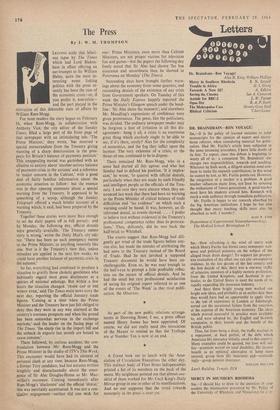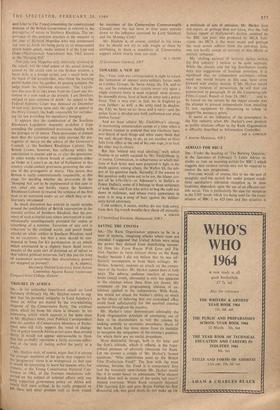MERCY IN SOUTHERN RHODESIA SIR,—I should like to draw to
the attention of your readers the information presented by Mr. Palley of the University of Rhodesia and Nyasaland (in a re-
cent letter to The Times) concerning the constitutional position of the British Government in relation to the prerogative of mercy in Southern Rhodesia. The im- portance of this position attaches at the moment to the case of Richard Mapolisa who was condemned last year to death for being party to an unsuccessful petrol bomb attack, under section 4 of the Law and Order (Maintenance) Amendment Act, 1963, known as the 'Hanging Bill.'
Not only was Mapolisa only indirectly involved in the attack, but the total extent of the actual damage caused by the attack runs to one broken window, a burnt hole in a lounge carpet, and a small burn on the hand of th6 householder, who threw the burning petrol bomb into his garden. In passing sentence the judge made the following statement : 'The Legisla- ture has seen tit to take away from the Court any dis- cretion in a case such as the present. I am therefore obliged to pass sentence of death.' An appeal to the Federal Supreme Court was dimissed on December 16 last year, leaving open only the right of appeal to the Privy Council, the body responsible for introduc- ing the law providing for mandatory hanging.
It appears that the constitution of the Southern Rhodesian, Legislative Assembly prohibits it from amending the constitutional provisions dealing with the prerogat.ve of mercy. These provisions at present state that the Governor may only exercise the pre- rogative of mercy on the advice of the Governor's Council, i.e. the Southern Rhodesian Cabinet. The British Crown, however, has authority within the constitution to amend. add to. or alter the provisions. In other words, without breach of convention either an Order in Council or an Act of Parliament in this country could contain provisions governing the exer- cise of the prerogative of mercy. This means that Britain is really constitutionally responsible, at this stage, for deciding whether the provisions of the 'Hanging Act' are to be implemented in this case or not, since one can hardly expect the Southern Rhodesian Cabinet to rescind the sentence of the first man to be sentenced under an act which they so de- liberately introduced.
So much discussion has centred in recent months around the justifiability of British intervention in the internal politics of Southern Rhodesia that the pre- sence of such a crucial case where intervention is con- stitutionally unambiguously provided for comes as something of a surprise. Terrorism of any sort is abhorrent to the civilised world. and petrol bomb attacks on white settlers in Southern Rhodesia need he no exception : but that a man should be con- demned to hang for his participation in an attack which eventuated in a slightly burnt hand surely smacks of the same sort of distorted set of values as that behind political terrorism. Isn't this just the kind of anomalous occurrence that discretionary powers are designed to prevent? A. N. SERPELL Secretary, Oxford University Joint Action Committee Against Racial Intolerance Corpus Christi College, Oxford



































 Previous page
Previous page